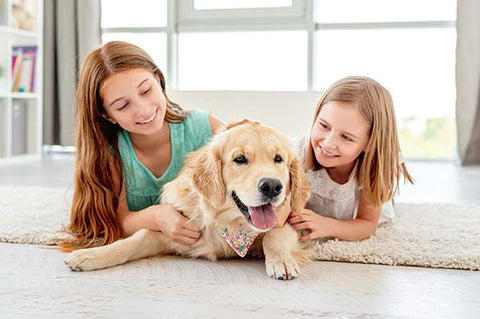Available via chat
Available via chat

If you share a home with furry family members, it’s important to consider how your essential oil use could be affecting them. Like humans, many different factors come into play with essential oil toxicity and sensitivity in pets. It’s a tricky topic that isn’t helped by a lack of research, but in general, there are a few best practice tips for essential oil use and pet safety.
As much as pets are part of the family, they are different animals! They process their environments and the chemicals in them differently, which is where essential oils can become an issue. First, their sense of smell is much more acute than ours, so what may be a pleasant level of scent to us could be very overpowering to cats and dogs.

Although we share the same organ (our livers) for processing chemicals, what they can handle differs. In general, cats and dogs aren’t able to eliminate toxins in the liver as well as humans. This is especially true to cats as they have fewer metabolising enzymes in their livers. This is why many more chemicals are toxic to cats and dogs than they are to us.
Like humans, there is also a huge difference in the effect of essential oils depending on the application. Essential oils are extremely potent and should not be consumed by pets or humans! But because pets groom by licking, we would also advise against any topical application unless prescribed by a vet or a professional. In fact, we would highly recommend talking to your vet about any concerns you have about using essential oils around your pet. In the interim, here is our general advice for what may be safe, what probably isn’t and how to diffuse with minimum risk.
In general, the following essential oils should be avoided around cats and dogs:
For cats, citrus oils, basil oil and peppermint may also be problematic.

The following oils are generally deemed safe for diffusion around cats and dogs:
The lists above aren’t exhaustive and the most important thing to remember is that your pet might be different. This is where diffusing safely comes into play.
When you introduce essential oils to your pet (or any new product) make sure you monitor your pet closely for any changes in behaviour. Common signs of discomfort and illness include a watery nose or eyes, redness, drooling, difficulty breathing, panting, coughing or wheezing. If this happens take your pet into fresh air and consider consulting your vet, especially if their condition doesn’t improve.
A gradual introduction is also key. Try to use one oil for a few days and stick with high-quality, single-origin oils as opposed to blends, fragrances or adulterated oils to make monitoring easier. Only diffuse essential oils in well-ventilated areas and keep the diffuser out of reach to avoid any accidents. Diffuse for no more than three hours and no more than five drops of essential oil at a time. Make sure your pet is able to leave the area if needed.

You might also consider using a passive diffuser until you know what oils your pets are fine with. A passive diffuser such as a reed diffuser, candle or heat diffuser doesn’t emit particles as effectively as an active diffuser. Active diffusers (humidifiers and vaporisers, nebulisers and ultrasonic diffusers) are much more effective at vaporising essential oils and spreading them through the air in mist. This is great for us, but to play it safe, wait until you’re sure your pet doesn’t have a negative reaction before using oils in an active diffuser.
As with any chemical products, make sure your essential oils are stored safely and be thorough when wiping up spills. It's also worth noting that these same precautions should be taken with any home fragrance products. This is especially true for synthetic products that aren't always as clear about what they contain and can be just as detrimental to your pet’s health.

The best thing you can do is talk to your vet and play it safe. Start small, keep an eye on your furry friend the first few times and never diffuse unsupervised. It will all be worth it when you’ve found the oils that keep everyone in your household healthy and happy naturally!
Leave a comment